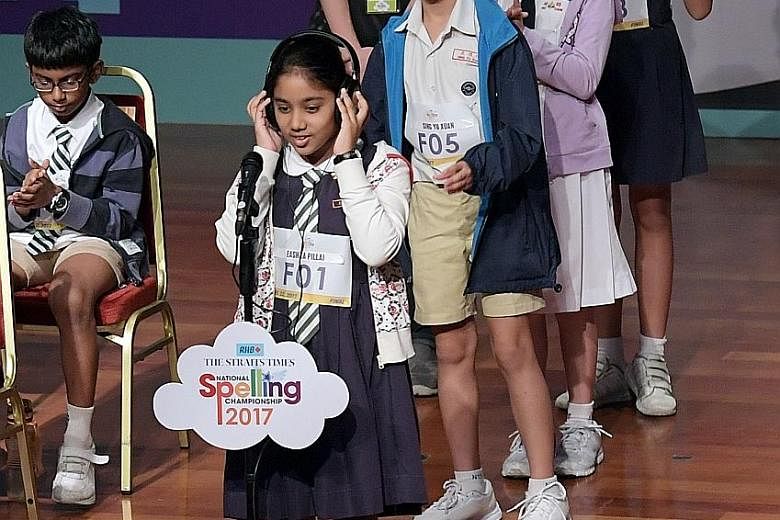The viscountess has had enough of your putrid fricassees - and you can take your kedgeree and biltongs too. Their homogeneity has left her positively lugubrious.
I'm half-watching the recent finals of the RHB-The Straits Times National Spelling Championship and making up sentences. I tried playing along and felt really clever with "fibrous" and "bazooka" and "vigilant", then "hauteur".
Then "grisette" and "llano" appeared and I realised that no, I was not smarter than a 5th grader, because frankly, next to these finalists I might as well be grunting and drawing on cave walls.
If you have never been to a Big Spell event, imagine Wimbledon in a public library - intense drama, in the quietest, most low-key manner possible.
I think competitive spelling is the most Singaporean sport ever, because
a) It's all about being smart in a weirdly specific way
b) Lots and lots of rules
c) You win when your opponent makes a mistake

d) Your parents and teachers get nice chairs to sit on and judge you from a distance. It takes very little space to play and your neighbours won't even notice.
Point c) - winning by keeping quiet while your rivals foul up - is, in my opinion, an underappreciated lifehack. It is how many of us, including me, have risen in their careers, and is more valuable than a year's worth of pre-school speech and drama courses.
These days, that lesson might be supplemented by taking out your phone and filming the massive boo-boo for sharing on social media, but that might be finessing it too much.
Anyway, back to the spelling finals.
The competition goes like this: Everyone is seated on stage, with a queue in front of the microphone. A child is given a word to spell, and he or she may ask for a definition or root language (Latin, French, Greek etc, because Latins love Cs, the Greeks their Ks, and the French stick "eu"s, "ue"s and "ou"s into places they don't beloungue). Foreigners have left handprints all over English, like tourists at Stonehenge.
Some children spell the word staring into space. Some write it with their fingers on palms. Some spell slowly and some spell quickly. There are mumblers and there are crisp ennuncitoiurs, enunciaters, the kids who speak good.
Adults in the audience, made up of family and teachers, are judging the judges as much as they are watching the children. They applaud quickly, right after a child spells, rather than wait for the judges to hold up either the Red Sign Of Doom, or the Green Sign Of You Did It, Kid.
There is a murmur in the hall. Someone has challenged the judgment on a word. There is a pause for a quick check and, like a lot of the challenges, it is dismissed.
I talk to a couple of teachers later and find that, like lawyers, teachers feel it is their duty to act, even if the claim is weak, because a one in a million shot is still a shot, right? Did I not tell you that this is the most Singaporean competition ever?
Trigger-fingered adults with Google on standby are a frequent source of challenges. As a judge tells me, Google can support any data point you want, even if it is wrong, so wrong, dead wrong, or climate-change denier-wrong, Obama-is-not-born-in-America wrong, vaccines-cause-autism wrong.
But rules are rules, and if a word is spelt in a way that is not in any of the reference dictionaries used by the judges, it is struck down, the Internet be darned. Google is like the "my friend says it's okay..." of my day.
When I was a kid arguing with my mother and gave her that line, she would say "If your friend jumped off a bridge, you'd do it too?"
The competition began with all 17 finalists on stage and after an hour, there are four left.
"Iniquitous" takes out one competitor. She asks for the definition - "grossly unfair and morally wrong", she is told - but it doesn't help.
Like her, anyone who gets knocked out has to take a walk to a holding area where they are to remain for the rest of the day. The reason for this, I'm told, is so that children can be more easily recalled if there is a tussle for a lower-ranked spot.
But another reason, I'm guessing, is to prevent an exodus of kids, parents and teachers as the competition goes on, leaving an almost-empty hall by the time we get to the end, which would be most anti-climactic. So in this roped-off Island Of Oh So Close, one has to watch as one's position falls further and further down the charts as the day wears on.
Honestly, if that doesn't build character in a child, I don't know what does.


